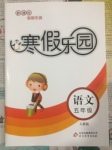题目内容
18.Everyone must have known the death of the waitress, __________?
A.must they B.mustn’t they C.haven’t they D.have they
C

 寒假乐园北京教育出版社系列答案
寒假乐园北京教育出版社系列答案A very strict officer was talking to some new soldiers whom he had to train. He had never seen them before, so began, “My name is Stone, and I’m even harder than stone, so do what I tell you or there’ll be trouble. Don’t try any tricks (诡计) with me, and then we’ll get on well together.”
Then he went to each soldier one after the other and asked him his name, “Speak loudly so that everyone can hear you clearly,” he said, “and don’t forget to call me ‘sir’.”
Each soldier told him name, until he came to the last one. This man remained silent, and so Captain Stone shouted at him, “ when I ask you a question, answer it! I’ll ask you again: What’s your name, soldier?”
The soldier was very unhappy, but at last he replied, “My name’s Stonebreaker, sir,” he said nervously (紧张地).
51. 1.The officer was strict _________.
|
A.because the soldiers were new. |
|
B.with any of his soldiers, new or old. |
|
C.because he was named Stone. |
|
D.only when he was before soldiers. |
52.2. According to what the officer said, _______________.
|
A.obeying his orders would sometimes bring no trouble. |
|
B.trouble would come if anybody made tricks. |
|
C.he always got on well with his soldiers. |
|
D.he often had trouble with his soldiers. |
53. 3.The last soldier remained silent because _______________.
|
A.he didn’t like the way the officer spoke to them. |
|
B.he wanted to see what would happen if he disobeyed his order. |
|
C.the question was difficult for him to answer. |
|
D.he was afraid the officer would be angry when he heard his name. |
54. 4.According to the officer, how to answer the question, “How old are you?”
|
A.(sadly) Twenty, sir. |
B.(clearly) Twenty. |
|
C.(loudly)Twenty, sir |
D.(quickly)Ten years younger than you, sir |
Remembering names is an important social skill. Here are some ways to master it.
Recite and repeat in conversation(谈话,交往).
When you hear a person’s name, repeat it. Immediately say it to yourself several times without moving your lips. You could also repeat the name in a way that does not sound forced or artificial(矫揉造作的,不自然的).
Ask the other person to recite and repeat.
You can let other people help you remember their names. After you’ve been introduced to someone,ask that person to spell the name and pronounce it correctly for you. Most people will be pleased by the effort(努力) you’re making to learn their names.
Admit you don’t know.
Admitting that you can’t remember someone’s name can actually make people relaxed. Most of them will feel sympathy if you say, “I’ m working to remember names better. Yours is right on the tip of my tongue. What is it again?”
Use associations(联络,联系).
Link(联系) each person you meet with one thing you find interesting or unusual. For example, you could make a mental note:“Vicki Cheng — tall, black hair.” To reinforce (加强) your associations, write them on a small card as soon as possible.
Limit the number of new names you learn at one time.
When meeting a group of people, concentrate on(集中精力) remembering just two or three names. Free yourself from remembering everyone. Few of the people in mass introductions expect you to remember their names. Another way is to limit yourself to learning just first names. Last names can come later.
Go early.
Consider going early to conferences(会议), parties and classes. Sometimes just a few people show up(到场) on time. That’s fewer names for you to remember. And as more people arrive, you can hear them being introduced to others — an automatic (无意识的)review for you.
1...How will most people feel when you try hard to remember their names?
|
A.They will be moved. |
B.They will be annoyed. |
|
C.They will be delighted. |
D.They will be discouraged. |
2..If you can’t remember someone’s name, you may ________.
|
A.tell him the truth |
B.tell him a white lie |
|
C.ask him for pity |
D.ask others to help you |
3...When you meet a group of people, it is better to remember________.
|
A.all their names |
B.a couple of names first |
|
C.just their last names |
D.as many names as possible |
4...What does the text mainly tell us?
|
A.Tips on an important social skill. |
B.Importance of attending parties. |
|
C.How to make use of associations. |
D.How to recite and repeat names. |
 I said, “I only have $6. I’m not sure how
many pretzels I need. You see, I work at a hospital and it’s closing and they
stopped selling pretzels.” The man’s smile disappeared. “What hospital?” “Oh, Northeastern
Hospital.”
I said, “I only have $6. I’m not sure how
many pretzels I need. You see, I work at a hospital and it’s closing and they
stopped selling pretzels.” The man’s smile disappeared. “What hospital?” “Oh, Northeastern
Hospital.”